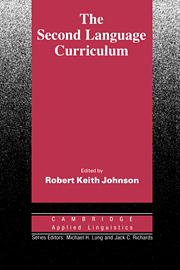Book contents
- Frontmatter
- Contents
- Contributors
- Series editors' preface
- Acknowledgements
- Overview
- I 1 CURRICULUM OVERVIEW
- I 2 CURRICULUM PLANNING
- II ENDS/MEANS SPECIFICATION
- III PROGRAMME IMPLEMENTATION
- IV CLASSROOM IMPLEMENTATION
- V EVALUATION
- Chapter 14 Language program evaluation: a synthesis of existing possibilities
- Chapter 15 The development and use of criterion-referenced tests of language ability in language program evaluation
- Chapter 16 Mastery decisions in program evaluation
- Chapter 17 Tailoring the evaluation to fit the context
- Bibliography
- Index
Chapter 14 - Language program evaluation: a synthesis of existing possibilities
Published online by Cambridge University Press: 05 October 2012
- Frontmatter
- Contents
- Contributors
- Series editors' preface
- Acknowledgements
- Overview
- I 1 CURRICULUM OVERVIEW
- I 2 CURRICULUM PLANNING
- II ENDS/MEANS SPECIFICATION
- III PROGRAMME IMPLEMENTATION
- IV CLASSROOM IMPLEMENTATION
- V EVALUATION
- Chapter 14 Language program evaluation: a synthesis of existing possibilities
- Chapter 15 The development and use of criterion-referenced tests of language ability in language program evaluation
- Chapter 16 Mastery decisions in program evaluation
- Chapter 17 Tailoring the evaluation to fit the context
- Bibliography
- Index
Summary
Introduction
The purpose of this paper is to examine the program evaluation literature in educational psychology with a view to synthesizing that which is most useful and applicable to the special problems of language program evaluation. To that end, various definitions of program evaluation will first be compared; then, the differences and similarities between ‘testing’, ‘measurement’ and ‘evaluation’ will be explored. Historical trends in program evaluation are also discussed with a focus on the productoriented, static characteristic, process-oriented and decision facilitation approaches which have developed over the past forty years in educational psychology. Three dimensions, specifically applicable to language programs, appear to be dominant in the general literature: formative vs. summative evaluation, product vs. process evaluation and quantitative vs. qualitative evaluation. This is followed by an enumeration of twentyfour different data-gathering procedures which are available to language program evaluators. These procedures are classified into six different categories, which can help the evaluator to select a more limited and practical subset of procedures for use in a specific language program evaluation. The paper concludes by tying together the historical developments, the three dimensions of evaluation theory and the large number of data-gathering procedures through discussion of a model (currently being applied at the University of Hawaii). This model functions as an integral part of the overall process of language curriculum development and maintenance.
Definitions of evaluation
Evaluation is defined in Richards et al. (1985) as ‘the systematic gathering of information for purposes of making decisions’.
- Type
- Chapter
- Information
- The Second Language Curriculum , pp. 222 - 241Publisher: Cambridge University PressPrint publication year: 1989
- 27
- Cited by



